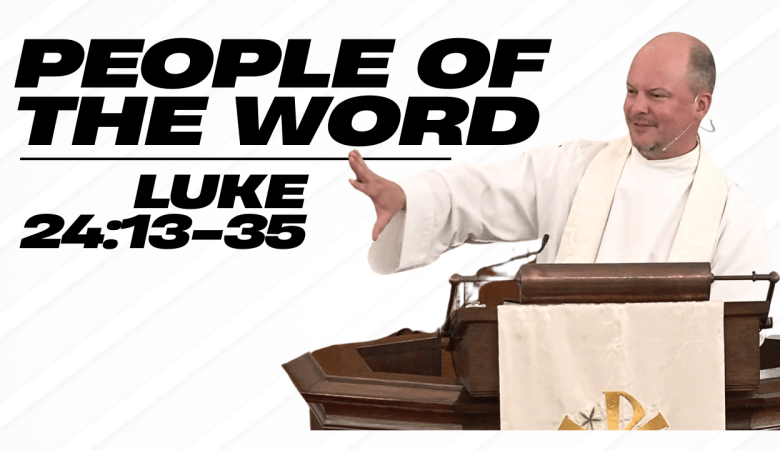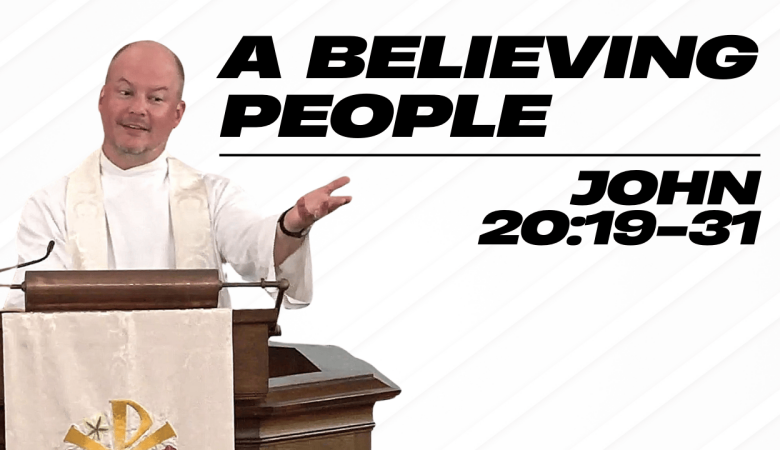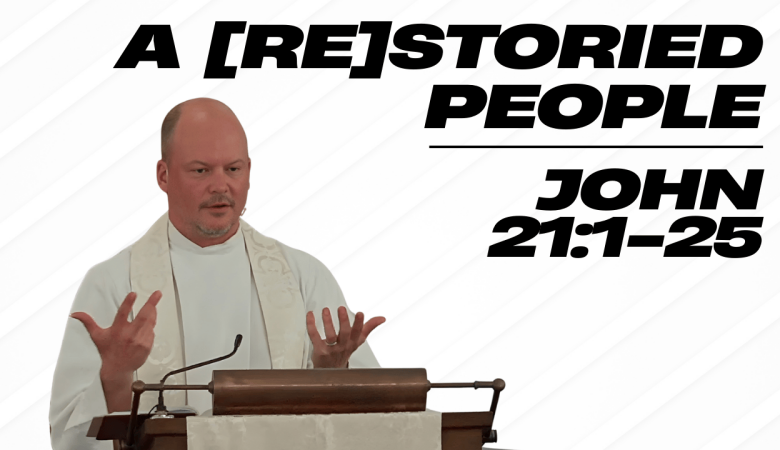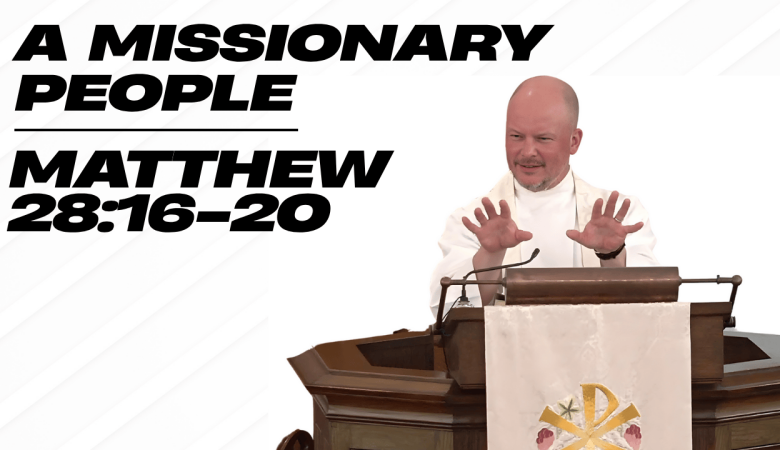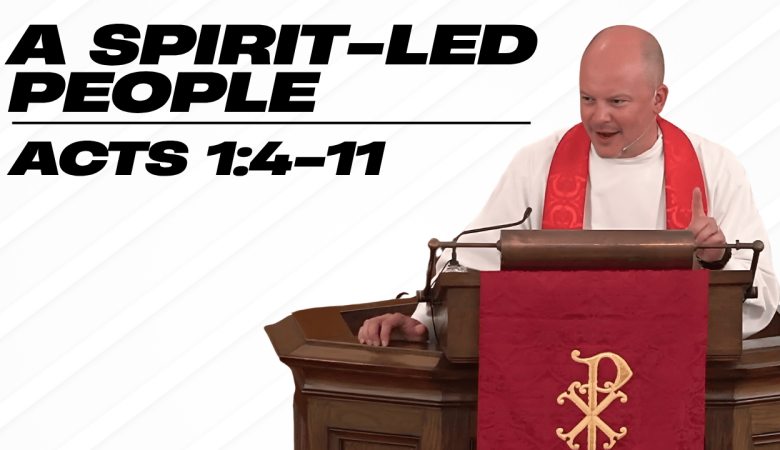Series: Resurrection Narratives
An (Almost) Confident People
June 01, 2025 | Jed Stalker
Passage: John 21:1-25
Summary
Rejection can cut deeply, making us question our worth and identity. But what happens when we feel rejected by Jesus himself? The apostle John's experience in John 21 provides powerful insight. Despite describing a scene where Jesus has an intimate conversation with Peter while seemingly ignoring John, the apostle still confidently refers to himself as 'the disciple whom Jesus loved.' This remarkable confidence demonstrates a profound truth: if you have confidence in Christ's love for you, you have all the confidence you need.We can develop this kind of confidence by remembering we are among the beloved community Christ has called, even when he doesn't seem to address us individually. We can also draw on past experiences of God's love as 'workable data' for present challenges. This confidence enables us to embrace the mystery of faith, recognizing that while Jesus isn't always predictable or controllable, he is good. It allows us to approach Christ with appropriate reverence while trusting his gentleness toward us. And it frees us from competitive comparison with others, knowing there's enough of Christ's love for everyone. When rejection threatens to define us, remembering our identity as Christ's beloved provides the foundation for facing whatever comes our way.
Transcript
An (Almost) Confident People
As Amy said this morning already, I am not the pastor at this church, so surprise visitors. We are glad that you are here, but you might not be getting our A game today. Try again sometime. In my day job, I'm a teacher at a local Christian school. And the drama production that we did this year was Jane Austen's Sense and Sensibility.
If you are unfamiliar with the plot of that story, let me tell you about it. So the main characters are two sisters, the Dashwoods, and they're in relatively difficult economic circumstances because their dad just passed away. Well, one of these sisters, Marianne, she falls in love with a guy named Willoughby, who is charming and romantic and quotes poetry. And as a guy who myself quotes poetry, sometimes I think it doesn't get much better than that. So Willoughby has to go away to London for a while, and the two sisters end up following him in part as a nice surprise.
And they catch up with him at one of these genteel parties that people apparently had in Regency London. And they're announced. The person at the door says, the Sisters Willoughby, or, excuse me, the Sisters Dashwood, or whatever. So he knows that they're there, but he won't come over and say, hi, Willoughby. He won't even, like, look in their direction.
So they're standing in the back saying, like, what's this guy doing? Right? Marianne thinks that she's engaged to this guy, so he's very intentionally not interested in them at this party. So after a little bit of this Marianne, who was played very ably by Lucy Hood in our production, she says, good God, Willoughby, what is the meaning of this? Have you not received my letters? Will you not shake hands with me? And he awkwardly says, more or less, oh, hi, I did get your letters. Bye, and leaves. He just leaves the party, right? So it turns out Willoughby is a bad guy.
He's been sort of emotionally using Marianne, and he doesn't want her encroaching on other more financially profitable areas of his life. So he pretty publicly rejects her. And the chapter in the original that is in Austen ends with this quote: "Every circumstance seemed uniting to heighten the misery of Marianne in a final separation from Willoughby in an immediate and irreconcilable rupture with him." And if you know the story, you'll know that Marianne will soon go and stand in the rain looking in the distance at Willoughby's house, and she will get so sick and feverish from this bad decision that she almost dies.
So what you can say is Willoughby's rejection of her and her reaction to it almost kills her. So that circumstance is fictional. It's exaggerated. This emotional exaggeration is part of Austen's point. It's called Sense and Sensibility. Right? She has two heightened sensibilities. But like Marianne, we do experience disastrous rejection sometimes, don't we? And those rejections can be deeply painful. And they don't have to be romantic, they can be social more broadly, they can be professional. Right. They can be anything, really. And even the memory of a rejection like this can bring on these intense feelings of shame and failure. Things that happened years ago, you don't even want to remember them.
Consider some examples and say you work at a job faithfully for like 15 years and give it everything you want, everything you've got, and then your boss retires and you apply for that position and the company gives the job to some other guy and everybody forgets that you had seniority and we just move on with our lives. Or say you don't get into the school or the program that you've applied to and set your heart on. Or say, say all your friends get together for a party and you're not invited. So these are greater or lesser degrees of rejection, but they all kind of do the same thing to us internally, don't they? Because what does the shame of rejection say to you? As Henry Nouwen, who is a psychologist, says, quote, "as soon as someone accuses me or criticizes me, as soon as I'm rejected, left alone or abandoned, I find myself thinking, well, that proves once again that I am a nobody."
Like Austen shows with Marianne Dashwood, that kind of thing can make you feel hopeless, like life doesn't make sense anymore. And maybe it'd be better to just stop caring. So how does this relate to our text today? Well, consider another example. Say you have this years long, beautiful friendship with another person. You love this person and you think this other person loves you. And then you run into that friend unexpectedly after an absence. And that friend is so deep in conversation with another person that he doesn't even notice you. He just sort of shrugs you off. Does that sound familiar?
It might, because that's literally the text of the gospel we just read. Consider John, who is the author of the Book of John was one of the disciples. He was one of Jesus's closest companions. He had a beautiful years long friendship with Jesus. And then Jesus goes and dies and then he comes back. This is a big deal. If you're unfamiliar with the plot points here, ask somebody about this later. It's something to think about. But when he comes back, he has this long, memorable conversation, not with John, but with a different guy, with Peter. So Peter Rowan preached about this two weeks ago, and he did a great job.
But the thing that I can't stop thinking about when I read this account is that the author of the story that we are reading is John, not Peter. Church tradition has always said that the phrase "beloved disciple" is referring to the book's author. He refers to himself that way in verses 7 and verses 20 of our chapter. And then again in chapter or in verse 22, it says, "this is the disciple who's bearing witness about these things." This is John who's telling the story.
So how John positions himself in the story is fascinating. So Jesus has risen from the dead. He shows up. This is everything John has been hoping for. And Jesus doesn't talk to him, to John at all personally. At least it's not in the text. He talks to Peter instead. And Peter, of all things, he brings John up. He wants to get the attention off of himself, apparently. And he sort of gestures over his shoulder at John and he says, "what about this guy?" and Jesus? This is not textual, but this is the way that I picture it sometimes. It says that Jesus turns and views something. It says that earlier with. With Peter, Peter turns and sees John. It doesn't say that about Jesus.
So I picture Jesus doesn't even look back at John, right? He refers to John in the third person. It doesn't say his name. He says, "if it is my will that he, he, him, that guy, if he remain until I come. What is that to you?" This is between you and me, Peter. What does that do to John? Think about it. This is the last chapter in the book that John is writing. There's no softening of the story after this. This could be an utterly crushing experience for the author of this book. Jesus considered Jesus kind of does a Willoughby, doesn't he? Right? John desperately wants to talk to him, and Jesus won't talk. Right?
John could feel rejected, left alone, or abandoned. He could allow himself to think, "well, that proves I'm a nobody" in Nouwen's words. And in order to turn up the intensity here, we're not just talking about us having hurt feelings, as important as that can really be. So if the same situation happened with different people, will it be right? It might be sad, but it's not the end of the world. But keep in mind, this is Jesus that we're talking about, right? Friends, if it turns out that Jesus doesn't like us as much as we thought as much as we hoped that he did. That is actually the end of the world.
If Jesus doesn't like us, there's no other court of appeals. There's no hope. We are, you and me, the new kids at the school of the Universe. And if Jesus doesn't speak up for us and say, "hey, come over and sit at my table in the cafeteria of creation," we will be sitting by ourselves forever. And the Bible calls that the outer darkness, where there is weeping and gnashing of teeth.
So I'm phrasing this socially rather than judicially, but I hope you get the point that I'm making. In fact, I think you could say earthly rejection. The experience of earthly rejection may be so powerful because it suggests eternal rejection by the one who really matters. Remember, the Lord himself says, "I will say unto them, depart from me. I never knew you." Right? This is people who thought they had confidence in Jesus, right? With that in mind, how can we be easy or happy in our relationship with Jesus?
Well, let's follow John. So we have good reason to believe, right here in the text, that John lived a long time. So verse 23 says that there was a rumor that the early church going around the early church, that John was never going to die. This suggests he lived a whole long time, right? We have other evidence to suggest that the Gospel of John was written significantly after the other three synoptic gospels. So it's entirely possible that John had to sit with this exact question for a long time. How can he know that he is beloved, right? If the last personal experience he has with Jesus is that of Jesus not speaking to him?
Well, here's the thing. He is the one who decides to end the Gospel message with this particular story. And he does it in such a way that it looks bad for himself. Look back at verse 20 with me. It says, "Peter turned and saw the disciple whom Jesus loved following them." Stop right there. He's following them. That's almost a pathetic, sad note here. Jesus goes and he has this intimate conversation with another guy, and John is just tagging along after them like a little dog, right? He's begging to be noticed. And Jesus doesn't say anything to him. And so this is a really bold move by John, or if you think about it in larger terms, knowing that the Scripture is inspired by the Holy Spirit, this is a really bold move by God himself.
Because John says he wrote this book, quote, "that you may believe that Jesus is the Christ, the Son of God, and that by believing you may have life in his name." That's just at the end of chapter 20, it's on the same page. So John is telling us, believe in Jesus, he's worth it. And then he's simultaneously showing us how Jesus doesn't pay attention to him, though he deeply desires it. This is a strange recommendation letter. So the question for me is, why does John write it this way? Why does he tell the story with him as sort of left out in the cold while Jesus talks to Peter?
And I think the best answer is this. John is utterly confident that Jesus loves him. And because he is confident, he's willing to tell the story in a way that might look embarrassing for himself, but or even bad for the Lord. Why? Because he trusts the Lord and he knows that what he does is right and is loving, even though it might not feel like it all the time.
So this is my sort of thesis statement here. It is, friend, if you have confidence in the love of Christ for you, you have all the confidence you need. I'll say that one more time. If you have confidence in the love of Christ for you, you have all the confidence you need. So let's break that down a little bit. I want to look at how John had confidence and then how our confidence can be like John's.
So first, John had confidence in Jesus's character generally. John had confidence that he was beloved because he was among the beloved. Look again in the chapter, the beginning of the chapter. In verse four, it says, "just as day was breaking, Jesus stood on the shore. Yet the disciples did not know that it was Jesus. Jesus said to them, children, do you have any fish?" Let's stop there. "Children" is what Jesus says. If you're reading another version, particularly the NIV, it might say "friends." "Friends, haven't you any fish?" I went and looked this up. In Greek, the word is children. There's a. Some of the manuscripts do say friends, but in any case, children or friends. Jesus calls his disciples to himself with this loving, intimate term.
And what does he do after he calls them? He provides for them. He feeds them. He instructs them how to get what they're looking for, and then he gives them what they're looking for. So I'm talking about fish, but I'm also talking about himself, right? That's more what they need. He eats with them. He shows them his physical body, which they had seen, remember, mangled and dead just a couple of chapters ago. And now it's up and moving and eating fish for breakfast. He's showing them that death is not the winner. And John knows John remembers that Jesus has said that he will never cast anyone who comes to him away. John had written that just in chapter six. So John can think, I'm anyone who will come to Jesus. John can think, I'm children, right? I'm one of those that the Lord has fed. And isn't that where we find ourselves here today?
So brother or sister, unless you are really extremely special, I do not think the Lord is going to audibly speak to you directly. Right? And so you're just like John in that regard. Jesus isn't speaking to him. He's not speaking to us. Okay. But I think that you and I can have the same type of confidence that John has here, because this is what happens week in and week out here in this church. So Jesus, in the person of his authorized representative, what does he do? He calls us to himself. He calls us children. He calls us friends. He teaches us. He provides us with a meal. He shows us his body.
We can have the confidence that John has. We can know that we are loved because Jesus calls his beloved to him and we are among the people he has called. But you might be saying, well, I believe that God has called the church to himself, but I'm not sure about his love individually for me, that's sort of the Calvinist problem, isn't it? In a nutshell. God loves some people, sure, but does he love me? That's the problem it seems like John could be dealing with here because Jesus is showing his love directly to Peter and not to himself.
So I want to say that John knows he is beloved. He has confidence because he has he has in the past experienced Jesus's love individually. He knows that being with Jesus has changed something in him. This is usable history for him. So John has had personal, intimate contact with the Lord and he will not forget it when things get difficult. So let's look back. I see this as sort of the fulcrum of the story. Verse 20 says, "Peter turned and saw the disciple whom Jesus loved following them, the one who also had leaned back against him during the supper." Let's stop there for a second.
I don't think there's any real plot connection in this current situation with the Last Supper. We don't need to remember. Oh, yeah, that was John. That was the guy who leaned back against him. So why does John bring it up now? I will suggest to you that this detail is here because it's so important to the author. John's experience leaning on Jesus that night, being close to the Lord is what gives him the personal confidence to know that Jesus loves him even though he's not directly experiencing that love in this part of the book, in this part of the story. Right. It's because this is a metaphor, but I think it's one that the text is pushing us to think about. He has been close to the Lord's heart because he's been close to the Lord. He knows he can trust him.
I said before that John uses the phrase "the beloved disciple" for when he speaks about himself. Can you guess where the phrase is first used? It's in chapter 13, which is the story of the Last Supper. Chapter 13, verse 23 says this: "one of his disciples whom Jesus loved," that's the first use of that phrase, "was reclining at the table at Jesus's side." This being close to Jesus was a life changing experience for John. Being close to Jesus that night changed who he is. It changed the way that he thought about himself and his place in the world. So he refers to himself as the beloved of the Lord ever after.
And I think he brings up that experience here because I think here John was tempted to be hurt by Jesus's seeming rejection of him and needs to fortify himself by the memory of Jesus's love that he experienced so personally so clearly back in chapter 13. And I think that the Lord. So stick with me here, this is a little, maybe too bold. I think the Lord wanted him to feel that apparent rejection. Why? So that John can tell us that sometimes things are uncomfortable, but we might still be the beloved of the Lord. Right. Sometimes it might feel like the Lord is not with us or is not paying attention to us, or is not showing us the love that we need. But we can remember that he has shown us his love, that we are truly the beloved. And we can bank on that because Christian, you can know the love of Christ if you were once dead in trespasses and sins and you have been changed by the love of Christ. If you know that you are a new creation because of your contact with the risen Lord, that can be workable data for you. That can be the grounds of your decision. That can be the lens through which you view all new experiences and our temptations to feel otherwise, that the Lord doesn't love us. Those are just temptations. There's. That's the story that sin is telling us. The Lord has shown us his love in Christ and we can think of ourselves as his beloved ever afterwards. Right? Jesus is big enough that your personal comfort and satisfaction are not always part of the current plan, but they are part of the eternal plan. That's confidence.
So I've called this sermon "An Almost Confident People," because I don't think I've got the same degree of confidence that John had. And I don't know that most of us will get there in this life, but we can start. We can get close to the heart of Christ in prayer, in the study of the Scriptures, in gathering at the Lord's table with the Lord's people. I think we can know the love of Christ that passes knowledge. As Paul says in Romans, we can have a mustard seed kind of confidence in him, and we can watch it grow as we trust him. So I wanted to say that you can have confidence that you are loved.
So if you followed me to this point, you might be asking, well, what does that confidence look like in the world? I'm glad you asked, friend. We can be confident in the face of mystery. One haunting thing about this episode, and with many of the stories of the resurrected Christ, is that the disciples don't recognize him. Isn't that kind of weird, right? They've been with this guy for a long time, and then he shows up and they don't recognize him. This is a repeated thing in all of the Gospel accounts. Look at verse 14. It says "this was now the third time that Jesus was revealed to the disciples after he was raised from the dead." And yet it says in the beginning they didn't recognize him. They did not know that it was him. He's shown up three times to them particularly, they still don't recognize him. Why? Jesus is a mystery.
You can't tell what he's going to do. You might not even recognize him when he does show up, right? And John and the other disciples are showing us here that we don't have to understand what God is doing in our lives all the time. In fact, I would say if there's no element of mystery in your faith, you probably don't have a biblical faith. If your God can't surprise you, your God isn't big enough. Do you feel a C.S. Lewis quote hovering on the horizon here? Well, I am happy to deliver. Here it is. "Of course, he isn't safe, but he's good. He's the king. I tell you." You cannot control Jesus. You cannot direct or constrain or anticipate him. But you can trust him. You can know he's good. You can be close to his heart.
Next. This is part, sort of a related part of that, right? You can be comfortable. You can be confident even when you're not comfortable. This is a strange. This is a strange episode, right? The resurrected Christ is strange. He doesn't fit in our world, right? So this is verse. I should read my, my text here. This is verse 12. "Jesus said to them, come and have breakfast. Now none of the disciples dared ask him, who are you? They knew it was the Lord." This is strange. Jesus feeds his people, "come have breakfast." That's nice, that's not threatening. But then look at this next part of the verse. "None of them dare to ask him, who are you? They knew it was the Lord." They don't dare to ask him because they knew.
So you don't say there's. They didn't dare to ask if there's no element of uncomfortability or fear, right? In Isaiah, that reading that we did in the Revelation reading we did this morning, the Lord says, "do not fear." Why? Well, because he's scary, right? He is holy. And when we recognize his holiness and our unholiness, we are properly in terror of Him. But he knows that we are dust. He will soothe our fears if we come to Him. Whoever will come to him, he will never cast out.
So lastly, if we can learn John's confidence in Jesus, we can be confident in our role. And that's the thing, I think, that follows from this really strange situation in which John is telling Peter's conversation. I think what's happening here is that because John knows himself to be the beloved disciple, he doesn't mind Peter being the beloved disciple as well. He doesn't have to be the hero of the story. The attention and the spotlight doesn't have to be on him. He knows that Jesus is going to get praise, get glory from his for his love for many, right? And he's happy to tell Peter's experience of belovedness. Okay?
So if we have this confidence, if we have John's kind of confidence in the resurrected Christ and His love, we don't have to elbow people out of the way in our rush to God, right? We don't have to pharisaically tear others down so that we look better than them. Rather than hating Peter and envying him, John gives praise to God because Peter is also the beloved. And when we get closer to knowing that we are truly the beloved, I think we will rejoice in the belovedness of others more as well. And we will know that our heart is being changed to be more like the merciful Christ when we do that. And by the way, we'll also be becoming more like John himself.
So here's an interesting biographical snippet about John that comes from the church Father Jerome. Quote: "When he [carried] at Ephesus to extreme old age and could only with difficulty be carried to the church in the arms of his disciples, and was unable to give utterance to many words, he used to say no more at their several meetings than this. Little children love one another. At length, the disciples and fathers who were there, wearied with hearing always the same words, said, master, why do you always say this? 'It is the Lord's command,' was his worthy reply. 'And if this alone be done, it is enough.'"
And I'll just say this. Do you remember when Jesus gave the new command that we love one another? The Last supper is the night that John was leaning up against him. Friend John went to his grave saying what Jesus said to him that night, the night that he learned that he was the beloved.
So I started with a story from Jane Austen. I'll finish with a quote from her. Her dad and her brother were Anglican pastors. Her early biographer, who was also a pastor, who's her nephew, said that there was no sincerer Christian than her. And she's a literary genius, so she's qualified. Anyway, at the end of Northanger Abbey, her early novel, she says that her intelligent readers will know that we're all hastening together toward perfect felicity. And friends, if you have confidence in the love of Christ, for you, well, that is absolutely true.
Let's pray. Oh, Lord God, you are good and your mercy endures forever. We praise you for this text. We praise you that John can know that he is the beloved. We pray, Lord, that you will show us your goodness and your glory and that we would respond as people who are called by your name and who love your purposes. We pray these things in Jesus name. Amen.
Series Information

The resurrection is Christianity’s central claim. If it did not happen, as Paul recognizes, “ we are of all people most to be pitied.” Yet to Jesus biographers, Matthew, Mark, Luke and John, there was no doubting the reality of the resurrection. Each paints a different picture of its meaning. To Matthew, the resurrection is the cosmic vindication of Jesus claims of divinity and his place as messiah. Matthew takes aim at Jewish skeptics and rulers. Mark is concerned with the bewilderment and mystery of the empty tomb. Luke is concerned the Jesus connection to fulfilled Old Testament prophesy. John wants us to see the resurrected Lord’s compassion as he interacts with the nascent faith of his troubled disciples. The point of these narratives, and Paul’s commentary later, is that the resurrection is profound and its scope perhaps beyond our immediate comprehension.

